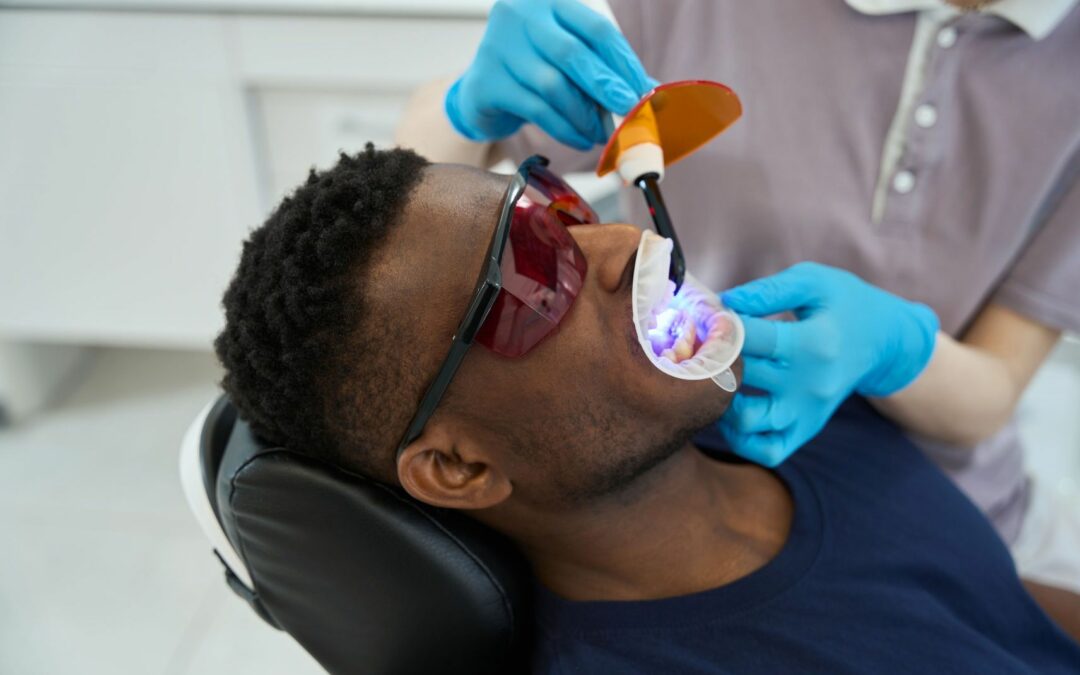Maintaining excellent dental hygiene is the foundation of a healthy smile. Regular brushing, flossing, and semi-annual visits to your dentist are crucial for preventing cavities, gum disease, and the buildup of harmful bacteria that can impact overall health. However, even with diligent care, the natural aging process along with lifestyle factors can lead to tooth discoloration. While basic dental hygiene protects your oral health, it might not deliver the dazzling, white smile you desire.
A radiant smile goes beyond aesthetics; it boosts confidence and leaves a lasting positive impression. If you’re looking to enhance your smile’s brilliance, there are powerful teeth whitening solutions available that can help. This post will explore what causes teeth to stain and various teeth whitening options, outlining their benefits and providing guidance on how to maintain your newly brightened pearly whites.
Why Do Teeth Stain?
Discolored teeth can arise from a variety of sources, often prompting the desire for teeth whitening treatments. Before exploring whitening options, it’s crucial to understand the origins of these stains. Many are simply the result of lifestyle habits: the foods and drinks we consume, like coffee, tea, red wine, and soda, as well as tobacco use. Poor oral hygiene also contributes significantly to surface staining. However, other factors, such as certain medications and oral trauma, can also lead to discoloration.
To better understand the types of tooth stains, we can categorize them as follows:
- Extrinsic Stains: These stains affect the enamel, the outer layer of your teeth. Common causes of extrinsic stains include:
-
- Food and beverages (coffee, tea, red wine, soda)
-
- Tobacco use
-
- Inadequate oral hygiene.
- Intrinsic Stains: These stains penetrate the tooth’s structure, affecting the dentin, and are more challenging to remove. Intrinsic stains can be caused by:
-
- Medications
-
- Excessive fluoride exposure
-
- Tooth trauma
-
- The natural aging process.
Recognizing the cause of your tooth stains can help you prevent further discoloration and choose the most effective whitening approach.
Teeth Whitening Options
Teeth whitening relies on two primary bleaching agents: hydrogen peroxide and carbamide peroxide. These substances lighten teeth by breaking down surface stains. Whitening treatments are categorized as either in-office or at-home systems, distinguished primarily by the concentration of the bleaching agent. Here’s a breakdown of the various methods available, along with their characteristics.
- In-Office Teeth Whitening:
-
- Performed by a dentist
-
- Uses high concentration bleaching agents (15% to 43%)
-
- Can usually provides instant improvement in a single session
-
- Often uses light or laser activation
-
- Typically, the most expensive method
- At-Home Teeth Whitening Kits (Professional):
-
- Dispensed by a dentist
-
- Trays with professional-grade whitening gel (3% to 20%)
-
- Gradual whitening over ten days to two weeks
-
- Generally, more effective than over-the-counter options
- Over-the-Counter Teeth Whitening Products:
-
- Whitening strips, gels, and rinses
-
- Lower concentration of bleaching agents
-
- More affordable but may take longer to see results
-
- Results vary greatly
- Whitening Toothpaste:
-
- Abrasive ingredients help remove surface stains
-
- Gentle and suitable for daily use
-
- Limited whitening effect
- Whitening Rinses:
-
- Contains hydrogen peroxide
-
- Helps remove surface stains
-
- Requires consistent use
Should I see my Dentist before Whitening my Teeth?
Before starting any teeth whitening treatment, it’s essential to address potential concerns regarding sensitivity and safety. Consulting with your dentist is crucial, as they can assess your specific needs and recommend the most appropriate whitening option, minimizing potential risks. It is also important to note that existing dental work, such as crowns, veneers, or fillings, will not be whitened by these treatments and may stand out in contrast to your newly whitened natural teeth.
Does Teeth Whitening Cause Sensitivity?
A common side effect of teeth whitening is temporary tooth sensitivity. This occurs when the bleaching agents contact soft tissue or root surfaces, irritating the nerves. The intensity and duration of sensitivity vary depending on the individual and the whitening method used. Your dentist can recommend strategies to manage sensitivity, such as using desensitizing toothpaste or adjusting the frequency of treatments.
Is Teeth Whitening Safe?
While teeth whitening is generally safe when performed or supervised by a dental professional, it’s important to exercise caution. Improper use of over-the-counter products or excessive whitening can damage your enamel and gums.
How Do I Maintain a White Smile?
Maintaining your newly whitened smile requires consistent effort. Practicing good oral hygiene, including regular brushing and flossing, is essential. Limit the consumption of staining foods and beverages. Incorporating a whitening toothpaste or rinse into your daily routine can provide ongoing maintenance. Scheduling regular dental cleanings for removing plaque and tartar buildup, which can contribute to staining. Finally, consider periodic touch-up treatments to keep your smile consistently bright and vibrant.
Keep your Teeth White with University General Dentists
Ultimately, achieving and maintaining a radiant smile involves a combination of diligent oral hygiene and informed choices regarding teeth whitening. By understanding the causes of tooth discoloration and exploring the various whitening options available, you can take proactive steps towards enhancing your smile’s brilliance. Remember, consulting with a dental professional is paramount to ensure safe and effective teeth whitening treatment tailored to your individual needs.
If you’re ready to unlock your brightest smile and experience the confidence that comes with it, schedule a consultation with University General Dentists today. Our experienced team can guide you through the whitening process, answer your questions, and help you achieve the dazzling smile you deserve. Don’t wait—take the first step towards a more confident you, contact us today.

